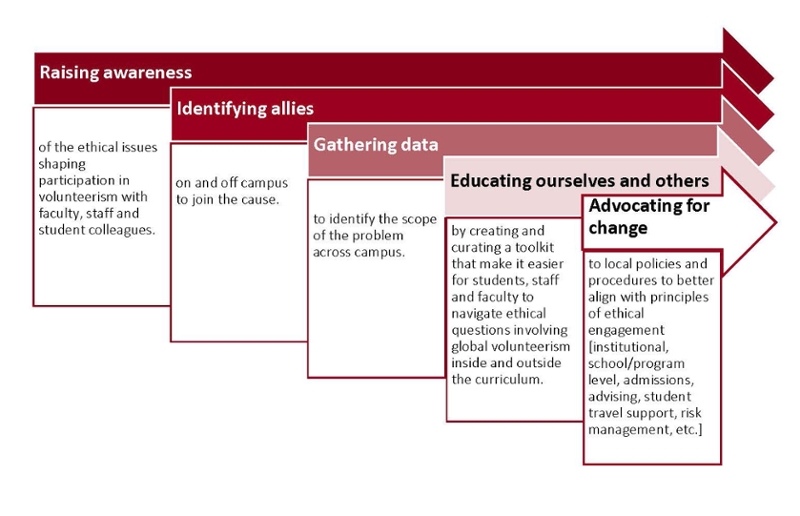Global Service Learning and Volunteerism
Global Service Learning and Volunteerism
Ensuring safe care and ethical learning in global volunteer experiences is a priority
The Problem:
Global volunteer experiences, if not well designed, may have unintended negative consequences and fail to improve the well-being and health of host communities. There is an urgent international need to address this issue as pre-professional and professional students seek out or are actively recruited to participate in global health volunteer experiences.
In poorly designed programs, host communities are exposed to untrained volunteers that frequently do not speak the local language, lack requisite cultural knowledge necessary for offering culturally appropriate care and provide casual labor that fail to offer sustainable care that host communities need to see substantial gains in community health and well-being.
What we are doing as a campus: 
Who we are:
The IUPUI Ethics on Global Health Volunteerism Working Group is a coalition of interested students, faculty, staff, administrators and community organizations committed to strengthening the ethical and humane use of volunteerism, service learning and global health experiences to support the health and well-being of host communities, to strengthen health systems and to facilitate student learning.
IU Global Health Core Principles
In the development, administration, marketing, orientation, implementation and evaluation of global volunteering and service learning programming, we uphold the following core principles:
- An appropriate cross cultural and ethical collaboration always respects the right of the host partner(s) to define the program, including the needs to be addressed and the role of the host.
- All programs should value a mutuality of learning and demonstrate a respect for the knowledge and expertise of local professionals, allowing them to lead whenever possible.
- All programs should demonstrate a respect for local governance and abide by the legal and ethical standards of the host partner(s) and host country(ies).
- In the recruitment, preparation and supervision of program participants, every opportunity should be taken to educate and remind participants of the ethical and cross cultural pitfalls of volunteering when there are disparities in power and affluence.
- Every effort should be taken to insure the sustainability and continuity of programs with the host partner(s) in order to avoid the exploitation of the partner’s needs for the volunteer’s benefit. Unsustainable initiatives are unethical as well as unproductive.
- All programs should be periodically and systemically evaluated for impact - positive and negative - on the host partner(s) as well as the participants.
Resources
- 7 Red Flags: Tips for International Volunteering
- 10 Tips for Traveling for Good
- Service Learning Course Taxonomies
- Study Abroad Taxonomies
- What to look for in global service learning
Want to learn more?
Contact Stephanie Leslie, Office of International Affairs, slleslie@iui.edu or Dr. Mary Price, Center for Service and Learning, price6@iui.edu or sign up for the working group listserv below.
